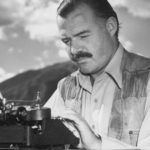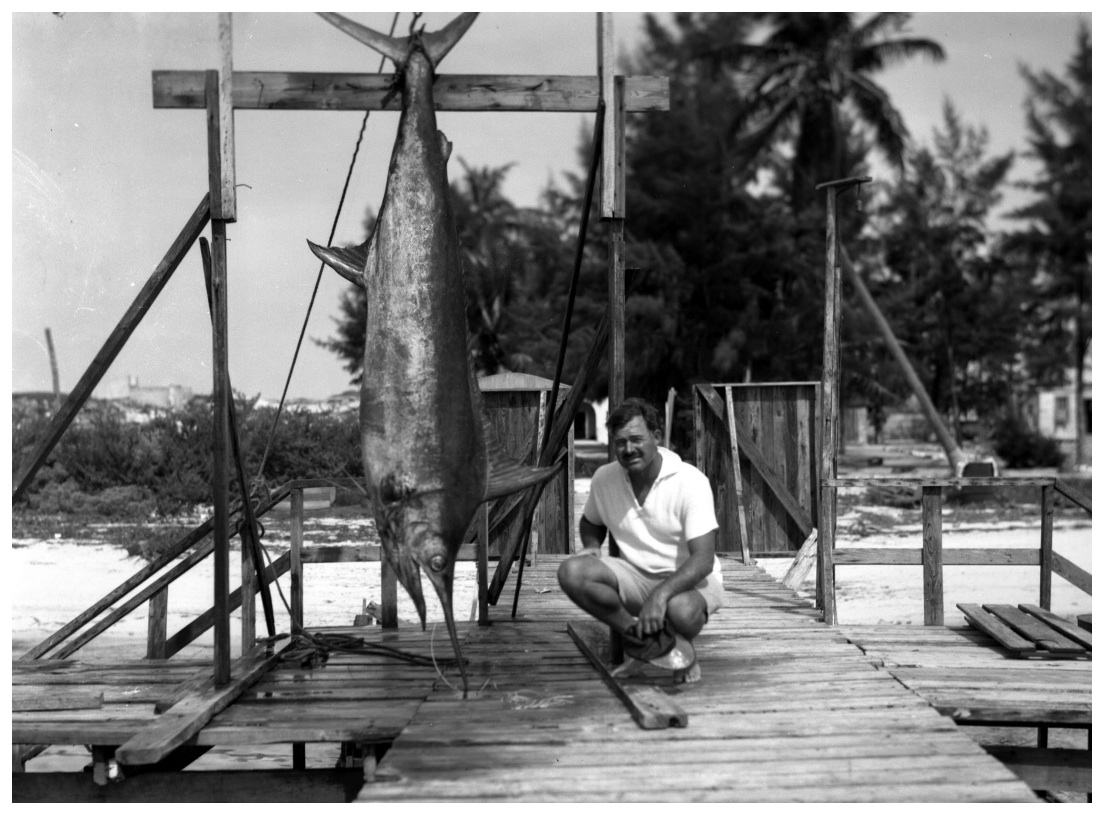Death of the Author, an essay on “The Snows of Kilimanjaro” by Tomasz Renkiel
The story about pain, about being fed up with the reality, about dying at the foot of the mountain which is said to be the highest in Africa. The thing as uncertain as the unknown presence of the mysterious skeleton of the leopard lying close to the western summit, dried and frozen. One ponders on the reason for the animal to climb that altitude. So far, the question with no straight answer : WHY. Why did the leopard climb the mountain ? How to explain logically what it was seeking there? How to explain what Harry was looking for, dying slowly at the foot of Kilimanjaro and struggling within himself with his sort of “writer’s block”?
 Some could say Harry blamed the girl for their coming to Africa. Your bloody money – was the rude answer to the girl having complained about the very fact of their coming on the Black Continent and that the “things” would have looked totally different if they had not arrived there; as if her purely materialistic approach to human life – the way Harry perceived the girl, at least – might have been the reason for his painful disease.
Some could say Harry blamed the girl for their coming to Africa. Your bloody money – was the rude answer to the girl having complained about the very fact of their coming on the Black Continent and that the “things” would have looked totally different if they had not arrived there; as if her purely materialistic approach to human life – the way Harry perceived the girl, at least – might have been the reason for his painful disease.
On the other hand, this disease was brought about by some “exterior factors”, though factors that occurred for they probably did something wrong : I don’t see why that had happen to YOUR leg? What have we done to have that happen to US ? – the girl asked.
Outwardly, she adored their sojourn together in Africa, but now, after this horrible accident, her hatred gained the upper hand of her admiration. She looked after Harry, cared about him and at last, she loved him, but still one can’t resists the strong impression that her unmingled and kind of tangible feeling towards Harry was only a perfect disguise, a black veil under which she tried to hide successfully her true face, the face of the Sister of Mercy.
Harry was passing away – or rather decaying – slowly in Africa, at the foot of the mountain said to be the on this continent. He forgot how to write ( in fact, he has never written anything at all ), although his memories, written recollections of the long gone past, of his days back in Europe seem to be something in the shape of the chapters of his next book. Now he would never write the things that he had saved to write until he knew enough to write them well. (…) Well he would never know, now. To think so means to be somehow conscious of the fact that You would never do all the things You were to do, since Your own life has changed co dramatically that there is hardly any space for creation, for something new to come into existence. The story about the chore boy was the one he had saved to write. He knew at least twenty good stories from out there and he had never written one. Why? Harry sinks into deep thought asks himself WHY ? But then, this is the girl he wants to answer this “tormenting” question he could not find the answer to, himself. He is the person who seeks, and seeks the truth, the absolute, absolute being the clue for his quest, and possibly the proper remedy for his powerlessness. The powerlessness of the dying writer.
The last scene of the story being Harry’s vision in sleep. A feverish dream of his returning back home in a little plane. It glides above the earth to change its direction quite unexpectedly and fly up over the top of Kilimanjaro. He sees the white square summit of the mountain, unbelievably white in the sun, so enormously huge but so dignified. And this is to be the “final cut” of his journey, the place of his eternal rest. In those days someone found the reason for the leopard to climb that altitude. Harry managed to find his fate. And then he knew that there was where he was going.


I think the statement “the last scene of the story being Harry’s vision in sleep” is not only an incomplete sentence, but simply wrong. In the flight scene at the end we find Harry rising up out of his earthly restraints. Although physically on earth he has died, his spirit as an artist has transcended what was restraining him on earth.
Interesing essay, but certainly should have expanded on what the excerpt about the leopard actually meant- since it was a particularly odd part of the story.
@ jonathan: To cite Scott Macdonald (“Hemingway’s ‘The Snow of Kilimanjaro’: three critical Problems”, SSF, p. 69): “whatever moral or artistic integrity is suggested by his reaching the mountain is something Harry wishes he were attaining, not something he actually attains”. There are various views on this aspect; but isn’t the image the reader keeps in mind the puzzling last scene of the hyena, a symbol of ugly death? Although we appreciate the wonderful idea of according salvation to Harry by his entering the “House of God”, we simply cannot neglect the last scene stressing Harry’s decay. @ drew: one simply needs to focus on sth; there is great variety of aspects you could also talk about.
do you think hemingway ever went on the kili? I don’t think so…. I’ sure it was only his prejudice that wrote this
yes, he wents…
hello please send me some short stories
Harry has gone on safari as a boxer goes to the training camp: he travels with a minimum of comfort as one of many correctives to a rich life of laziness and deceit (he does not love the woman he has “conveniently” married, a woman who, on the other hand, very much loves him.). The ease with with he infects (the scratch becomeing gangrenous) is the measure of his spiritual decay . Now lying near death on a low and stifling terrain with vultures and hyenas (scavengers), the images of his corrupt self, all about him, he determines he will set matters aright with his life – but this requires him to write as he should have done and to denounce his wife who represents the life he must repudiate if his conscience is to be satisfied. On the positive side, Harryy remembers and reviews those experiences he should have written about, experiences that particularly tell scenes of struggle, daring and achievement. His last memory is of his giving his own morphine to a horribly dying friend. He awakens and tells his wife, “I’ve been writing,” and under these circumstances the intention to do so is morally equal to the fact. And just as he has risked so much in giving morphine to his friend, he now concludes that the will die with a bad conscience if a good one requires him to hurt the woman who has loved him so well and who does not deserve his selfish renunciation. (This is very similar to Huck Finn’s crisis in tht novel: Huck elects to go to Hell rather than betray his friend, Jim). Dying now with the best conscience, he imagines his ascent to Heaven/Kilimanjar in a plane piloted by a man who resists simple comforts, and a plane in which there is no room for Harry’s wife.